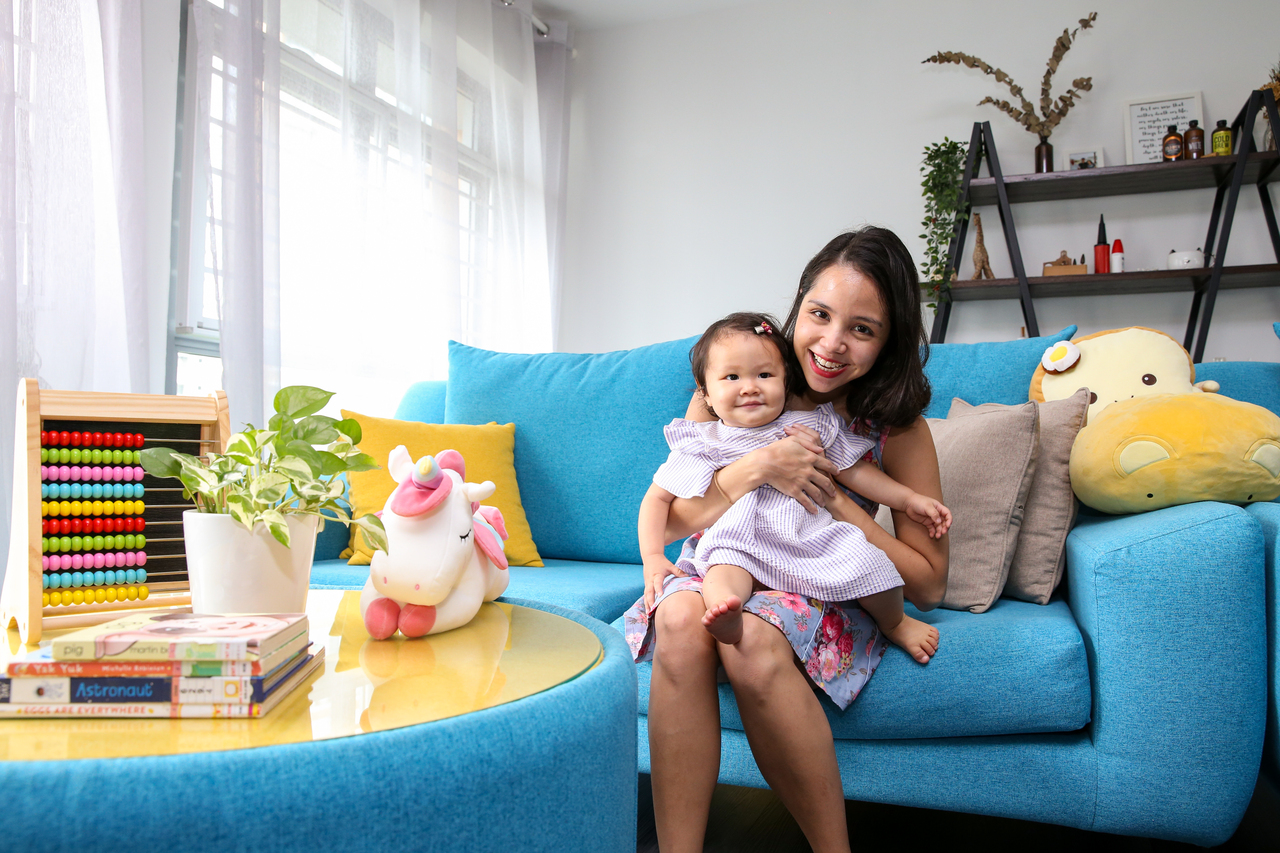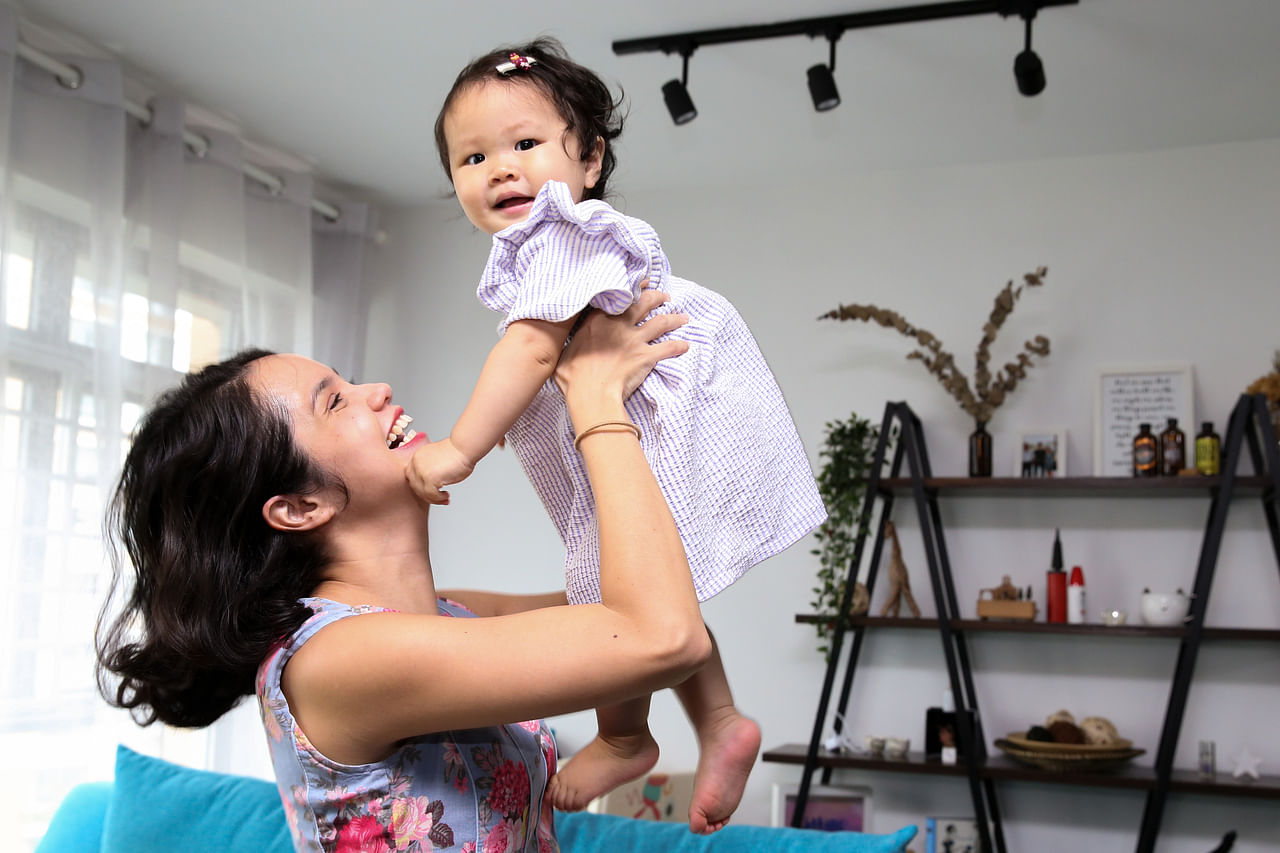Working from home amid Covid-19 pandemic helps mums breastfeed babies for longer
Sign up now: Get tips on how to help your child succeed

Ms Christel Goh, managing director of GrowPR, and her daughter Fayth Teo, one, in their flat on July 11, 2021.
ST PHOTO: YONG LI XUAN
Follow topic:
SINGAPORE - When Ms Christel Goh, 30, became a new mother in July last year, she did not expect to be still breastfeeding 12 months later.
Despite problems like clogged ducts, pumping during Zoom work calls and her laptop motherboard short circuiting because she spilt breast milk on it, she found herself loving the ability to feed and soothe baby Fayth through nursing.
"If not for Covid-19, I would probably be going out a lot more for meetings. It would take me away from her and it would be a lot more difficult when expressing milk," says the managing director of GrowPR, who plunged back into work after delivery.
One of the pandemic's silver linings is that stay-home culture has helped mums breastfeed longer, despite initial fears of infection and keeping up with ever-evolving safety guidelines.
"From the anecdotal accounts of nursing mothers who bring their babies for follow-up at our neonatology clinics, working from home as a default work arrangement has been a boon rather than a bane," says Associate Professor Chua Mei Chien, head and senior consultant in the department of neonatology at KK Women's And Children's Hospital (KKH).
Before the pandemic, working mums often found it difficult to continue nursing their babies when they returned to work.
"Working from home presents opportunities as it allows mothers to be physically more present to nurse their babies and it reduces the hassle of transporting their pumps and storing the milk," says the executive committee of the Association for Breastfeeding Advocacy (Singapore), the professional accrediting body for the Baby Friendly Hospital Initiative here.
This trend even benefited the KK Human Milk Bank, which has maintained a two-month reserve of milk "even as milk banks in other countries experienced a sharp decline in donations", notes Prof Chua, who is also its director.
Interestingly, the average volume of milk donated has more than doubled over the past year, from 12 litres to 30 litres. The milk bank provides pasteurised donor human milk to premature and sick infants in hospital, as well as other babies who meet its eligibility criteria.
Much has changed since the early days of the pandemic, when the health authorities grappled with the far-reaching effects of the virus.
During the circuit breaker last year, new mothers struggled as they were isolated from their usual sources of breastfeeding support, such as lactation consultants, confinement nannies and their extended families, says Ms Khatim Hamidon, president of the Breastfeeding Mothers Support Group.
National University Hospital (NUH) associate professor Citra Mattar says it initially restricted breastfeeding for Covid-19-positive mothers during the circuit breaker.
"Now we know it is still possible to breastfeed with active Covid-19 (if the mother is relatively well) as it is also beneficial due to the transfer of antibodies. We also recommend it after Covid-19 vaccination," says Assoc Prof Citra, a senior consultant from the maternal fetal medicine division of the obstetrics and gynaecology department.
Face-to-face breastfeeding support pivoted to calls and clicks. KKH saw a significant increase in the number of mums who used its lactation teleconsultation service during the pandemic, says Ms Cynthia Pang, its senior lactation consultant and assistant director of the Nursing and Lactation Service.
Thomson Medical also started telephone and Zoom consultations on parentcraft for new parents that included breastfeeding tips, after seeing more demand for home visits during the pandemic, says Ms Fonnie Lo, assistant director and lactation consultant, Thomson ParentCraft.
The Breastfeeding Mothers' Support Group saw 30 per cent to 50 per cent more sign-ups for its workshops and group counselling sessions conducted via Zoom. "This was especially since pregnant mothers and mothers with newborns were naturally more cautious about attending onsite events", says Ms Khatim.

Ms Christel Goh found herself loving the ability to feed and soothe baby Fayth through nursing.
PHOTO: ST
Ms Florence Tay, 37, who runs Lovemere, a maternity and nursing wear brand, says she has received more inquiries on nursing products since the pandemic started.
"More mummies asked about breastfeeding tips and increasingly had interesting breastfeeding questions," says the mother of three children aged two to seven, who is still breastfeeding her youngest, Bryan, as she now works from home.
"For example, through our collaboration with a hospital, we have mummies asking about relactation after two months and others wondering if they could drink the excess breast milk since it increases the immunity of babies. There is keen interest to find out all they can about breastfeeding."
In the pivot online, however, not everyone sought out qualified experts. Dr Mythili Pandi, a family physician and international board-certified lactation consultant, notes that as mothers sought help via social media platforms, such as Instagram and Facebook, "we often see mothers who have been given incorrect advice on managing their breastfeeding issues, leading to infections and further breastfeeding problems".
With the national focus now on Covid-19 vaccinations, mothers' concerns have naturally turned to this issue, Ms Khatim of the Breastfeeding Mothers Support Group says. Some worry about the side effects while others wonder if they should delay breastfeeding.
"Breastfeeding, beyond offering babies comfort and nutrition, also offers protection in the form of antibodies. Ensuring mothers get the support that they need in order to breastfeed, and hence to protect the most vulnerable in our society, is truly pressing and of utmost importance, especially in a pandemic," she adds.

Ms Siti Aida nursed all her 3 kids and is still breastfeeding her youngest, who turns 3 in Jan next year.
PHOTO: ST
Ms Siti Aida Mohd Samudi, 36, a front-line worker, continued to nurse her two-year-old, Ahnaf, even after getting vaccinated in February. Although the local advice at that time was to "pump and dump" her breast milk, she saw that the World Health Organisation's website sanctioned breastfeeding after Covid-19 jabs and found that other mothers on the support group's Facebook group had successfully done so.
She monitored Ahnaf at regular intervals when nursing him after taking her shots and was relieved when he continued to be healthy. Ms Siti, who credits her extended breastfeeding journey to her husband and supportive supervisors who allowed her to pump during work breaks, wants to continue nursing her son until he weans himself off.
"Breastfeeding is something I really find quite special. It's bonding between me and the baby," she says.
Dr Mythili says employers can do more to help working mothers who want to nurse in the workplace, such as providing a clean space - "not toilets", she stresses - and protected time to express milk and store it.
"It is a national health issue and not just a personal one."
How to breastfeed safely in the pandemic
Is formula safer than breastfeeding during the pandemic?
"No. Here is the hierarchy of food sources for infants: Breast milk from their birth mother, breast milk from a milk donor, followed by formula," says Dr Mythili Pandi, a family physician and international board-certified lactation consultant, who has three children aged seven to 11.
"We explain to mothers that breastfeeding is not easy to begin with, it is a learnt process but with practice, they can master it," says Mrs Josephine Ong, director of nursing at IHH Healthcare Singapore, which includes hospitals such as Gleneagles, Mount Elizabeth, Mount Elizabeth Novena and Parkway East. Spousal support is critical, she adds.
Can Covid-19 pass through breast milk?
"We have no data on whether Covid-19 virus particles can pass through breast milk but understanding that the antibodies from breast milk do protect the baby may help to assure mothers of its safety," Dr Mythili says.
However, infected mothers can transmit the virus through "respiratory droplets during breastfeeding or intimate contact", so if you suspect you have it, follow precautions such as wearing a mask and practising good personal hygiene.

Ms Siti Aida credits her extended breastfeeding journey to her husband and supportive supervisors who allowed her to pump during work breaks.
PHOTO: ST
Is it safe to breastfeed after a Covid-19 vaccination?
Yes. "There are studies which have proven that there are antibodies produced by the mother's breast milk against the Covid-19 virus and it increases with time," says Dr Mythili.
If I had close contact with a suspected Covid-19 case, should I stop breastfeeding?
Continue nursing your baby as the antibodies produced by your body protect against infection, she says. "But do get tested using the PCR (polymerase chain reaction) test and quarantine yourself along with your baby."
How do I express milk while working from home?
A good quality double electric breast pump is ideal, says Dr Mythili. Make sure that the pump's flanges fit well. If there is too much areola pulled into the funnel, it is too big. If there is friction between the sides of the nipple and the funnel, it is too small.
Mums should remember that the "breast pump is almost never as effective as a baby latching on, so the yields are not an indication of how much milk can be produced".
They should also learn to express by hand that helps to unclog milk ducts.
Where can I get breastfeeding support?
The Breastfeeding Mothers' Support Group runs a counselling hotline and WhatsApp service on 6339-3558. It also has a Facebook group.
The KKH Lactation Service operates from 8am to 4pm on weekdays on 6-CALL KKH (6-2255-554). Or approach your maternity hospital for assistance.
The National University Hospital and the NUS Yong Loo Lin School of Medicine are organising a webinar on Aug 14 titled Breastfeeding: A Shared Responsibility In Covid-19 Pandemic. Register at this website.
Correction note: This story has been updated to include the NUS Yong Loo Lin School of Medicine as a co-organiser of the webinar.

